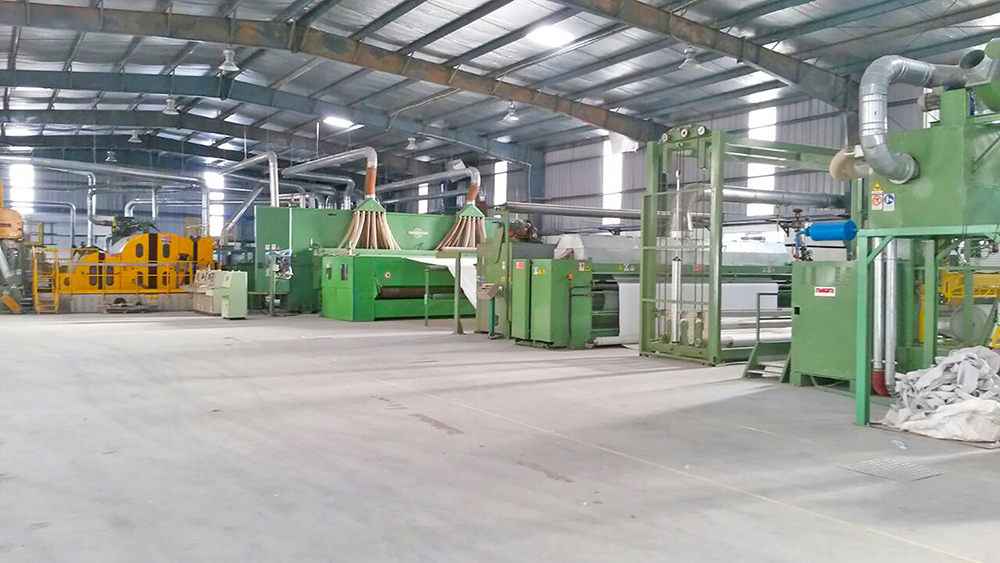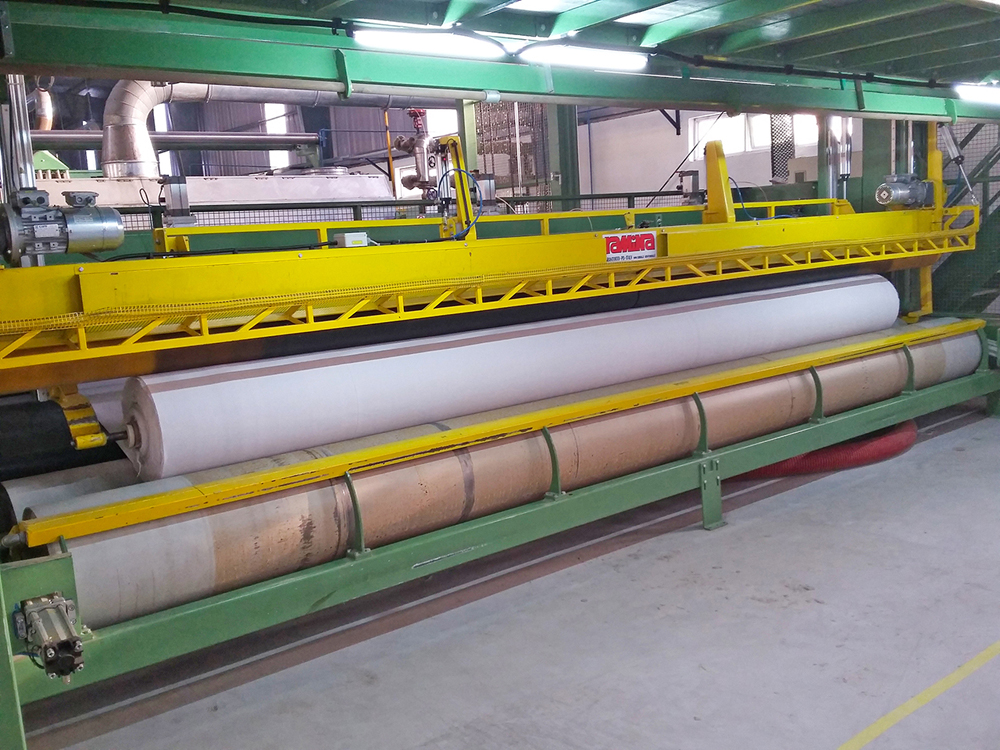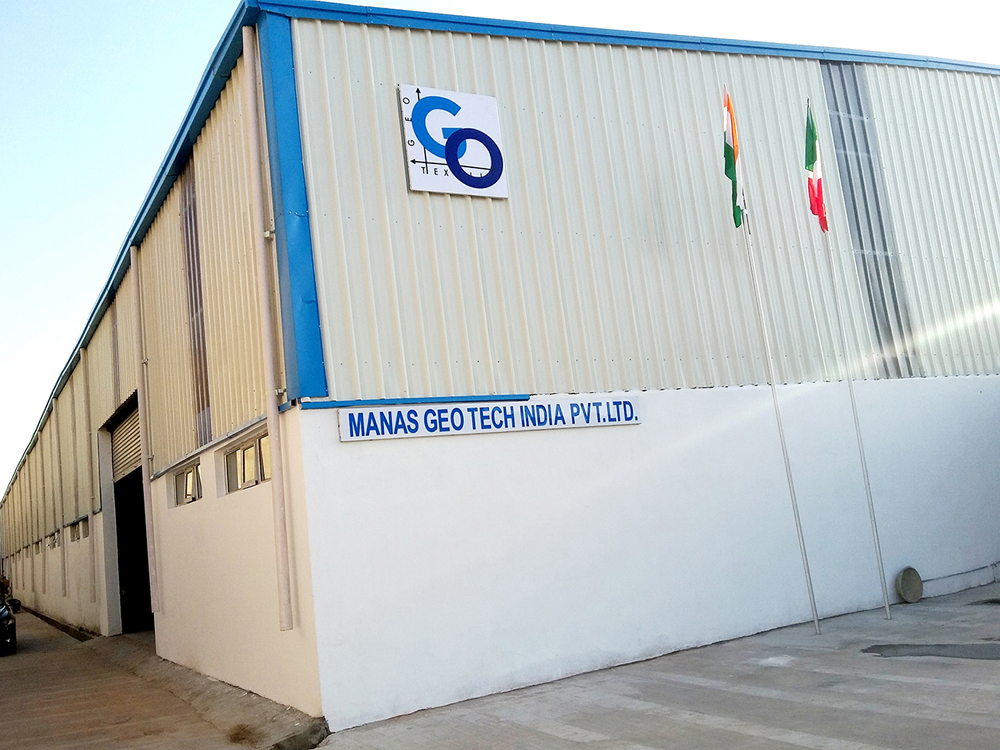Beneath most roads, tunnels, retaining walls and other surfaces in modern infrastructure building are geotextiles. It is of no surprise that a majority of the material is being supplied by Bawal, Haryana-based Manas Geo Tech India. Not only is it spreading its base in the domestic market but also internationally. Ganesh Kalidas meets the 26-year-old scion of Manas Geo Tech India – Kartik Kanodia, Director (Sales and Operations) – for an exclusive interaction and comes away impressed with the company’s vision, reach, portfolio and most importantly, their strong market position in the geotextiles segment

Dig deep into the gravel and you will invariably find geotextiles grounding the modern infrastructure together. The probability of finding the material made by Manas Geo Tech India is almost sure-fire – more so in India and also internationally. Manas Geo Tech has managed to help lay most of the country’s infrastructure since their foray into the nonwoven geotextiles segment in 2015. Geotextiles help in stabilising the soil beneath any construction. And the Ministry of Road Transport and Highways has already given the official go-ahead for its use in building roads, tunnels, railways, canals, landfills and ports.
Elaborating about the role played by the company in this segment, Kartik Kanodia, Director (Sales and Operations), Manas Geo Tech India, says, “We are a solution provider while being a manufacturer of nonwoven geotextiles. We imported a state-of-the-art European five-metre width machine and set up our plant in Bawal, Haryana. Though China-made machines were also available, they do not offer stability and uniform quality across the material. European machines cost 500% more than Chinese ones, but they are sustainable and last long.”
As per predictions, the nonwoven geo textile industry in India will be increasing at a CAGR of 12% from 2016-2025 with the government’s push on Indian infrastructure. The number will only go up from here. The company’s capacity is to churn out 3,000 tonnes per annum and as of now it is working to almost full capacity. About 70% of their product is consumed by the domestic market and 30% is exported to about 18 countries including those in the Middle East, Africa, Maldives, Europe, America, Bhutan, Nepal and Bangladesh, among others. “About 40% of our sales come from exports and the rest from domestic demand,” Kanodia states.
Creating a Niche
Manas Geo Tech created a niche for themselves in the nonwoven geotextiles at a time when there were not many players. By offering good quality product, Manas Geo Tech struggled through the initial tough years but stood strong and trained its focus on exports too besides serving the domestic market. Elaborates Kanodia: “We have always had certain projects in mind that we wanted to get involved with in the future and geotextiles was one of them. We took time to study this segment and zeroed down on the basics like what would be an ideal machine and from where we should source it besides studying the demand and supply scenario.”

“Today, this material is mandatory for road construction in the US and China. And India is the next upcoming market in terms of quality infrastructure. There are not many manufacturers in India. In fact, we are the only manufacturer in North India,” he adds. A few companies are entering this segment and the existing ones are now putting up more plants, indicating a growth trend. “We can take on competition well and also grow big by ensuring quality. Our product consistently passes the random laboratory checks and tests conducted on foreign soil,” Kanodia shares. And therein is the secret of success of Manas Geo Tech.
USP – Mastering Geotextiles
As a solution provider, Manas Geo Tech looks at the technical requirements of the customer and recommends the ideal GSM rather than sell the material as a commodity. “Our technical team understands the product specifications. Hence, we do not offer customers different thicknesses of the material but make expert suggestions. For example, if a client needs the material with a tensile strength of 10 kilonewton we recommend the GSM that would be appropriate for their need. It means that we customise the specification as per the requirement. Our machinery is extremely specialised and advanced which makes the quality we offer supreme. And that is why our product finds great acceptance from around the world,” Kanodia states. Manas Geo Tech manufactures nonwoven geotextiles from 150 to 1,500 GSM.
Milestones Achieved
Supplying geotextiles to the Mumbai-Vadodara expressway patch being built, which is part of the Delhi-Mumbai expressway, and the Rohtang tunnel are but two prestigious projects under the company’s belt. Kanodia shares an interesting titbit: “One of our customers has achieved four record titles in laying concreted roads as part of the Mumbai-Vadodara expressway and has entered the Golden Book of World Records and the India Book of Records. They have built the highest quantity of rigid pavement of 18.75 metres width continuously in 24 hours. And they awarded us with a certificate of appreciation for giving them our utmost support. Our forte is to supply to projects where the technical specifications are over the price.”

Manas Geo Tech has made vast inroads into the railway projects too where their geotextiles are laid under the tracks. In ports, the company is supplying material to the Jawaharlal Nehru Port Trust (JNPT), besides catering to the naval submarine base being built in Visakhapatnam. Also, the company’s geotextiles are used in NTPC Kurki and Karanpara. Internationally, Qatar’s stadia, which are getting readied for the upcoming FIFA World Cup 2022, have sourced geotextiles from Manas Geo Tech. Kanodia proudly shares: “Currently 90% of our exports are directed to Qatar. We supply to the trading organisations there that are catering to the building of the stadium. Currently, we are supplying more than 10 containers of material a month. We are approved by the authorities in Qatar and besides the stadium our products are being used for their highways and tunnels also.”
Impact of the Pandemic
The pandemic may have dampened spirits and economies around the world, but Manas Geo Tech more than survived the ordeal. The plant was shut for two months during the lockdown in 2020 but with the central government’s huge push on infrastructure the company is looking at their usual business numbers as were prior to the pandemic. “The infrastructure projects which were on hold are now on track, and the government is investing huge amounts in building the roads and highways,” Kanodia informs.
“Another positive for us is that earlier our product was mainly being used in road and tunnel construction but now recently the railways have also approved geotextiles for soil stabilisation. This is a new business arena for us post the pandemic and hence the demand and supply scenario is going to be smooth,” he further states. However, there is a big challenge. Importing the raw material polypropylene has been an obstacle. Explains Kanodia: “India-made polypropylene is not on par with the world quality. We import it from Saudi Arabia and China. But post the pandemic, sourcing the raw material has become erratic as the shipments are not coming in time.”
Expansion Plans
Manas Geo Tech is in the process of setting up a new plant for PVC geo membrane extrusion in Bawal, near their main factory. Elaborates Kanodia: “The PVC geo membrane is used in tunnels along with geotextiles for waterproofing. Currently, we are one of the largest suppliers of geotextiles in the tunnel segment. The new plant will have a production capacity of about 5,000 tonnes annually and by July 2021 the plant would be ready. A new machine has been ordered, and we are awaiting its arrival.”

Vision 2025
Kanodia and his team are working hard on becoming a one-stop shop for all geotextile needs in the domestic market and are keen on educating contractors on the material’s various benefits. “In broad terms, we wish to push the use of geosynthetics and we plan to put up multiple factories. The best part is that nonwoven geotextiles can be used in many areas. An example would be a reinforced earth wall or RE wall and the contractors can reduce their cost by 30-40% and time. But they are unaware of it as yet,” Kanodia says.
Manas Geo Tech develops its own technology and has a research and development team in place backed by a strong technical, quality and sales teams. The company’s contract with the Italian machine suppliers ensures that any breakdown in their machines is addressed by them for a 10-year period. For Kanodia, the golden words to succeed are hard work, quality output and ethical work practices.
Company CSR Manas Geo Tech India has partnered with One Tree Planted that aims to plant 50,000 trees for landscape restoration in 2021. For every order received, Manas Geo Tech India will plant a tree. Kanodia says planting trees is one of the best ways to combat the damaging effects of climate change. The objective of the partnership is to support global reforestation efforts and raise awareness about the importance of ecosystems’ restoration.





